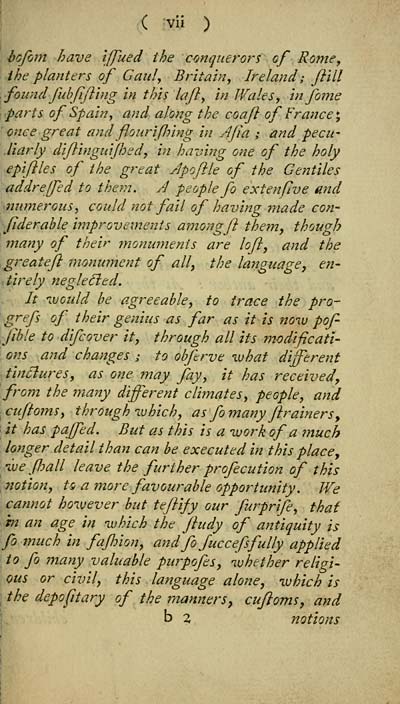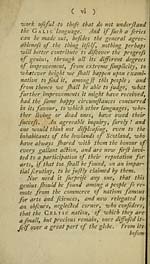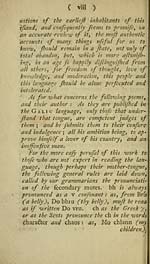J. F. Campbell Collection > Ais-eiridh na sean chánoin Albannaich; no, An nuadh oranaiche Gaidhealach
(23)
Download files
Complete book:
Individual page:
Thumbnail gallery: Grid view | List view

( vii )
■òcfom have tjjued the conquerors of Rome,
ihe planters of Gaul, Brìtaìn, Ireland ; ftìll
yfoiindfubfifììnginthìslajìy 'tnWales, infome
■ parts of Spain, and along the coajì of France",
once great and flourìfnng in AJìa ; and pecu-
Harly dijìinguified, in having one of the holy
epifìles of the great Jjpoflle of the Gentiles
addrejfed to them. /J people fo exten/ìve and
numerous, could not fail of having ?nade con-
fìderahle improvements amongft themy though
many of their monunienis are lofl, and the
greatefl monument of all, the language, en-
itirely negleded.
It ivould be agreeable, to trace the pro-
grefs of their genius as far as it is now pof
Jìble to difcover it, through all ìts modificati-
ons and changes ; to obferve what dijferent
tinclures, as one may fay, it has receivedy
from the many different cUmates, people, and
cuflomsy throughwhich, as fomany flrainers,
\ ìt has paffed. But as this is a work ofa tnuch
longer detail than can be executed in this place,
we ffall leave the further profecution of this
\ Jiotion, tQ a more favourable opportunity, We
cannot however hut teflijy our furprife, thaf
hì an age in which the fludy of antiquity is
fo much in fafnon, and fo Juccefsfully applied
\to fo many valuable purpofes, whether religi-
ous or civil, this language alone, which ìs
'Xthe depofitary of the manners, cuftoms, and
L' b 2 notions
■òcfom have tjjued the conquerors of Rome,
ihe planters of Gaul, Brìtaìn, Ireland ; ftìll
yfoiindfubfifììnginthìslajìy 'tnWales, infome
■ parts of Spain, and along the coajì of France",
once great and flourìfnng in AJìa ; and pecu-
Harly dijìinguified, in having one of the holy
epifìles of the great Jjpoflle of the Gentiles
addrejfed to them. /J people fo exten/ìve and
numerous, could not fail of having ?nade con-
fìderahle improvements amongft themy though
many of their monunienis are lofl, and the
greatefl monument of all, the language, en-
itirely negleded.
It ivould be agreeable, to trace the pro-
grefs of their genius as far as it is now pof
Jìble to difcover it, through all ìts modificati-
ons and changes ; to obferve what dijferent
tinclures, as one may fay, it has receivedy
from the many different cUmates, people, and
cuflomsy throughwhich, as fomany flrainers,
\ ìt has paffed. But as this is a work ofa tnuch
longer detail than can be executed in this place,
we ffall leave the further profecution of this
\ Jiotion, tQ a more favourable opportunity, We
cannot however hut teflijy our furprife, thaf
hì an age in which the fludy of antiquity is
fo much in fafnon, and fo Juccefsfully applied
\to fo many valuable purpofes, whether religi-
ous or civil, this language alone, which ìs
'Xthe depofitary of the manners, cuftoms, and
L' b 2 notions
Set display mode to: Large image | Transcription
Images and transcriptions on this page, including medium image downloads, may be used under the Creative Commons Attribution 4.0 International Licence unless otherwise stated. ![]()
| Early Gaelic Book Collections > J. F. Campbell Collection > Ais-eiridh na sean chánoin Albannaich; no, An nuadh oranaiche Gaidhealach > (23) |
|---|
| Permanent URL | https://digital.nls.uk/77282599 |
|---|
| Description | Volumes from a collection of 610 books rich in Highland folklore, Ossianic literature and other Celtic subjects. Many of the books annotated by John Francis Campbell of Islay, who assembled the collection. |
|---|
| Description | Selected items from five 'Special and Named Printed Collections'. Includes books in Gaelic and other Celtic languages, works about the Gaels, their languages, literature, culture and history. |
|---|

